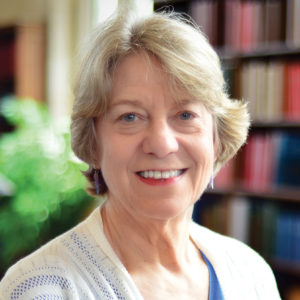In August, 2014, the nation’s attention turned to Ferguson, Missouri, after a young African-American man, Michael Brown Jr., was shot by a white police officer. The civil unrest that followed lasted for weeks. The aftershocks still continue.
How did that unrest impact older people in the community?

A new study, by a leading gerontologist at the Brown School at Washington University in St. Louis, shows that issues related to safety remain their highest concern, along with a breakdown in intergenerational communications and an expressed desire for more exchange.
“Safety was a very interesting topic because people talked about it in various ways,” said Nancy Morrow-Howell, the Bettie Bofinger Brown Distinguished Professor of Social Policy and director of the Harvey A. Friedman Center for Aging.
“Feeling unsafe if stopped by police, feeling unsafe because the police may not intervene, feeling unsafe after dark on the streets in the aftermath of the protests, feeling unsafe in loud community meetings,” added Morrow-Howell, lead author of the study, “Experiencing Civil Unrest: Elder Voices on Ferguson,” published in the Journal of Gerontological Social Work.
While the study group ranged in age from 64 to 93 years old — with the average age being 75 — Morrow-Howell expected those findings would resonate in a much younger Ferguson-area subset.
I want (young people) to know an older person cared about how they felt and I wanted to tell them I grew up in the Civil Rights era.
African American female study participant
“I imagine that, in general, younger people felt the same way,” she said. “Perhaps one difference is that the older adults felt more vulnerable during the protests. For example, some felt like they needed to leave the protests at nightfall because they could not run or protect themselves if needed.”
The aim of this study was to learn how older adults experienced the social unrest. Ten focus groups were conducted with 73 participants, with nearly 60 percent being African American. Eight themes were identified. Issues related to safety were most commonly discussed. Participants reported a breakdown in intergenerational communications and expressed a desire for more exchange.
“I was surprised to learn that these older adults, many who participated in the civil rights movement, felt unappreciated by younger folks,” Morrow-Howell said.
“They felt like their knowledge and experience were not valued. They really wanted to somehow support the younger generation but didn’t know how,” she said.
This work was supported by a grant from the Offices of the Chancellor and Provost and the Institute for Public Health at Washington University in St. Louis.
Comments and respectful dialogue are encouraged, but content will be moderated. Please, no personal attacks, obscenity or profanity, selling of commercial products, or endorsements of political candidates or positions. We reserve the right to remove any inappropriate comments. We also cannot address individual medical concerns or provide medical advice in this forum.